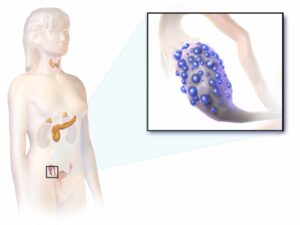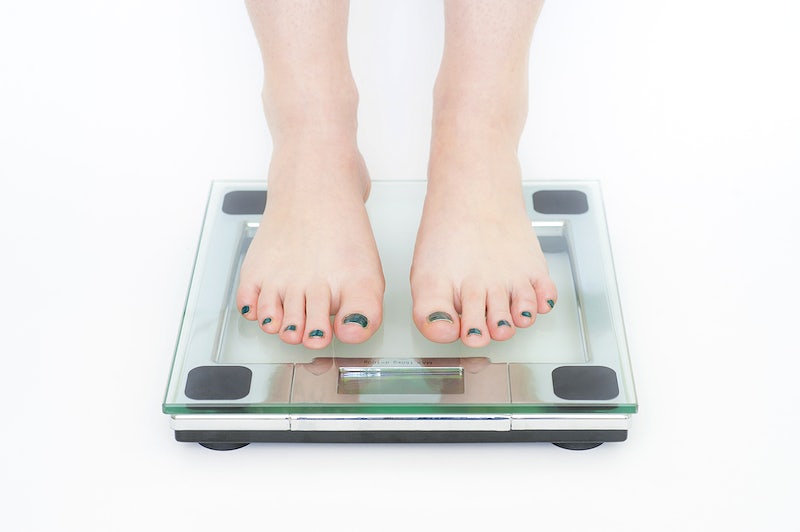If you have been struggling to lose weight, even though you are eating healthy and exercising regularly, you may have Polycystic Ovarian Syndrome (PCOS). PCOS is a condition that affects women of childbearing age and can lead to weight gain, insulin resistance, and other health problems. In this blog post, we will discuss the link between PCOS and weight gain and provide some tips for how to manage your weight if you have PCOS.
Contents
What Is PCOS?
 PCOS is a hormonal disorder that affects many women, causing a range of symptoms including irregular menstrual cycles, acne, excessive hair growth, and weight gain. PCOS is caused by an imbalance of the hormones estrogen, progesterone, and testosterone.
PCOS is a hormonal disorder that affects many women, causing a range of symptoms including irregular menstrual cycles, acne, excessive hair growth, and weight gain. PCOS is caused by an imbalance of the hormones estrogen, progesterone, and testosterone.
The exact cause of PCOS is unknown, but researchers believe it could be related to high levels of insulin in the body. Insulin resistance can lead to higher levels of androgens (male hormones) and lower levels of female hormones like estrogen and progesterone. This hormonal imbalance causes a disruption in ovulation, resulting in irregular or absent periods.
The most common symptoms of PCOS include weight gain, excessive hair growth on the face and body (hirsutism), acne, and irregular menstrual cycles. Other symptoms may include thinning hair on the head, ovarian cysts, anxiety, depression, infertility, and sleep disorders.
Weight Gain And PCOS
Given below are the 9 reasons why weight gain is associated with PCOS:
Insulin Resistance
Women with PCOS are more likely to have insulin resistance. Insulin resistance can prevent the body from breaking down glucose, resulting in higher levels of sugar in the blood and increased fat storage in the abdomen area.
Here are 5 ways by which you can improve your insulin sensitivity:
- Eat a healthy, balanced diet that includes plenty of fresh fruits and vegetables, lean proteins, and complex carbohydrates
- Incorporate regular exercise into your routine
- Avoid sugary drinks and processed foods
- Reduce stress by participating in relaxing activities like yoga or meditation
- Get adequate sleep each night
Hormonal Imbalance
 As mentioned above, women with PCOS have an imbalance of hormones that can lead to weight gain. An increase in testosterone can cause a decrease in sensitivity to insulin, leading to higher levels of blood sugar and weight gain.
As mentioned above, women with PCOS have an imbalance of hormones that can lead to weight gain. An increase in testosterone can cause a decrease in sensitivity to insulin, leading to higher levels of blood sugar and weight gain.
Here are 5 ways by which you balance your hormones:
- Eat a healthy, balanced diet that includes whole grains, lean proteins, and healthy fats
- Reduce stress by participating in relaxing activities like yoga or meditation
- Exercise regularly and get adequate sleep each night
- Manage your PCOS symptoms with medication or supplements
- Avoid exposure to toxins like cigarette smoke, air pollution, and certain chemicals
Stress
Stress is known to affect weight gain and women with PCOS often experience higher levels of stress due to their symptoms. It increases cortisol production which triggers the release of stored fats for energy, causing further weight gain.
Here are 5 ways by which you can lower your stress levels:
- Exercise regularly
- Get adequate sleep each night
- Practice mindfulness or relaxation techniques
- Eat a healthy, balanced diet
- Connect with friends and family members for support
Low Physical Activity
 Women with PCOS often have lower levels of physical activity due to their symptoms, such as fatigue and pain. Lower physical activity leads to weight gain as the body is unable to burn the excess calories.
Women with PCOS often have lower levels of physical activity due to their symptoms, such as fatigue and pain. Lower physical activity leads to weight gain as the body is unable to burn the excess calories.
Here are 5 exercises that could help ease the symptoms of PCOS:
- Swimming
- Walking
- Yoga
- Pilates
- Tai chi
Poor Diet
Women with PCOS tend to consume more processed and sugary foods which can contribute to weight gain. These foods are usually high in carbohydrates and low in essential nutrients that can help regulate hormones and insulin levels, leading to further weight gain.
Here are 5 foods that are healthy for PCOS:
- Fresh fruits and vegetables
- Lean proteins like fish and chicken
- Whole grains
- Healthy fats like olive oil, nuts, and seeds
- Fermented foods like yogurt and kimchi
Medication
Women with PCOS may be prescribed medications that can cause weight gain as a side effect. It is important to talk to your doctor about any potential side effects and alternatives before taking medication for PCOS.
Here are 5 medicines that could potentially cause weight gain:
- Corticosteroids
- Antidepressants
- Birth control pills
- Insulin-sensitizing drugs
- Anti-seizure medications
Menopause
As women age, their hormones become imbalanced and they are more likely to experience menopausal symptoms such as hot flashes and mood swings. These hormonal changes can also lead to weight gain due to the body’s reduced ability to burn calories efficiently.
Here are 5 things you can do to control your hormones after menopause:
- Eat a healthy, balanced diet
- Incorporate regular exercise into your routine
- Avoid sugary drinks and processed foods
- Manage stress with relaxation techniques
- Get adequate sleep each night
Sleep Apnea
Sleep apnea is a condition in which breathing stops during sleep, resulting in disturbed sleep cycles and excessive daytime fatigue. This can contribute to weight gain by decreasing the body’s ability to burn calories and by increasing levels of the hunger hormone ghrelin.
Here are 5 ways by which you can improve the quality of your sleep:
- Establish a regular bedtime routine
- Avoid caffeine and alcohol late at night
- Exercise regularly during the day
- Keep your bedroom cool, dark, and quiet
- Limit your screen time before bedtime
Genetics
Some women are genetically predisposed to developing PCOS which can increase their risk for weight gain. It is important for women with a family history of PCOS to consult with their doctor. Preventative measures can reduce their risk of developing this condition and its associated symptoms.
How Can I Control My PCOS Weight Gain?
The best way to manage weight gain due to PCOS is by making lifestyle changes. Exercising regularly and eating a well-balanced diet can help ease the symptoms of PCOS. Additionally, medications that can help regulate hormones and reduce insulin resistance may be prescribed by a doctor. It is important to talk to your healthcare provider about the best course of treatment for you.
With the right support and lifestyle changes, managing weight gain due to PCOS can be achievable.
Conclusion
Women with PCOS are more likely to experience weight gain due to a variety of factors. Hormonal imbalance, stress, menopause, genetics, etc are some of those factors. It is important to consult with a healthcare provider to develop an individualized plan for managing weight gain. With lifestyle changes, women can take control of their health and reduce the risk of developing further complications.
Consider contacting FitMantra for additional information on nutrition and fitness. You can also get in touch with their nutrition experts through our online nutrition counseling, who can guide you through the process and help you achieve your fitness goals. You can also lose weight with the help of our weight loss program. Download our Fitness app on Android to learn more about us. We provide effective online PCOS program and menopause program.
